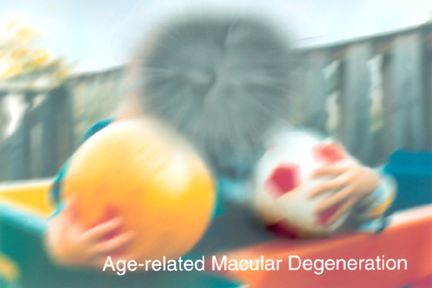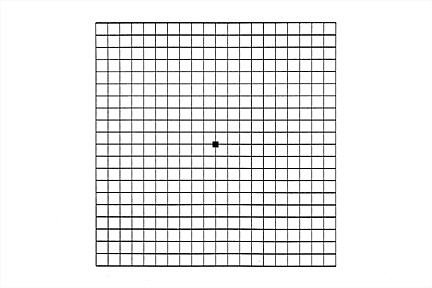Home » Blog » We’re Living Longer But No One Told Our Eyes!
We’re Living Longer But No One Told Our Eyes!
Posted by: Georgia Eye Associates in General
Good News! Over the past forty years our life expectancy has increased by eight years! Unfortunately, our eyes are having trouble keeping up. By about age 40, our eyesight starts to weaken. Then, at around 60, the chances for getting age-related macular degeneration (AMD) increase.
What is Macular Degeneration?
Age-related macular degeneration (AMD) is a leading cause of severe vision loss in patients over 65. AMD makes it difficult to perform activities like reading and driving. This condition affects the part of the retina (the macula) that gives you sharp central vision, but leaves the eye’s peripheral vision intact. Thus, objects in the center of your vision may appear blacked out, blurry or distored as seen in this photo compliments of the National Eye Institute:

Detecting Macular Degeneration
One warning sign of macular degeneration is when words on a page look blurred or straight lines look distorted. You can check your vision daily by using an Amsler Grid.
To use this grid:
- Wear your reading glasses and hold this grid 12 to 15 inches away from your face in good light.
- Cover one eye.
- Look directly at the center dot with the uncovered eye.
- While looking at the dot, see if any of the lines appear wavy, blurred or dark.
- Repeat with the other eye.

If these lines appear wavy you should make an appointment with your eye doctor. A medical eye examination will be performed that includes specialized photography that finds abnormal blood vessels, fluid or blood under the retina.
Treating AMD
While there is limited evidence that supplements prevent cancer and chronic disease, one exception is with age-related macular degeneration (AMD). A two part Age Related Eye Disease Study (AREDS[i] ) sponsored by the National Eye Institute (NEI) was designed to learn more about the natural history and risk factors of AMD and cataracts. Results from AREDS part one showed that high levels of antioxidants and zinc significantly reduce the risk of advanced (AMD) and its associated vision loss. The NEI launched the second AREDS study, which amongst other things, looked more closely at the benefits of omega-3 fatty acids on the development of AMD. While most conclusions are pending, it has been found that regular consumption of fish and omega-3 fatty acids found in fish reduce the risk of age-related macular degeneration significantly. This study will be published in the June issue of the Archives of Ophthalmology (a JAMA/Archive journal).
While the most common form is dry macular degeneration that is caused by aging. The “wet” form of macular degeneration is more severe causing a significant amount of vision loss in a high percentage of cases. In these cases, doctors use a laser to slow or stop leaking blood vessels that damage the macula. Another form of treatment is through anti-VEGF drugs. These drugs help reduce the growth of abnormal blood vessels and slow their leakage.
The doctors at Georgia Eye Associates specialize in treating Macular Degeneration. If you suspect that you or a loved one has Macular Degeneration, call us at:
Lawrenceville: 770-749-7234
Buckhead: 404-998-4320
Tucker: 770-284-3729
Call us at 770-749-7234, Ext. 7887 for your free AMD eye vitamin and mineral sample.
[i]The Age-Related Eye Disease Study (AREDS) is a major clinical trial sponsored by the National Eye Institute, one of the Federal government’s National Institutes of Health.
Tags: Macular Degeneration